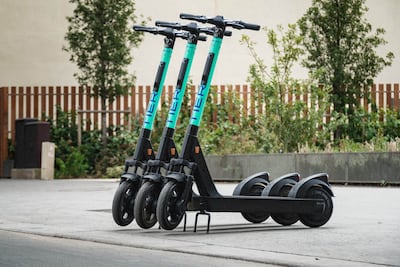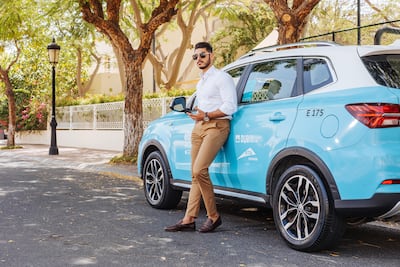Jonathan Adeline, a French web designer, takes the Dubai Metro from his home in The Views to Jumeirah Lakes Towers and then uses an e-scooter to commute from the train station to his office. He uses public transport and micro-mobility provider Tier to avoid the cost and hassle of owning a car.
“The e-scooter has been a huge help, especially when commuting around JLT during my lunch breaks,” he says. “Tier also makes my daily commute to work cost-effective. As I use Tier on a daily basis, I have subscribed to their packages to receive a discounted price.”
Tier also has hotspots around JLT, which help Mr Adeline to start his journey from one end of the community and end the day by parking the e-scooter in an alternative hotspot.

A growing number of people around the world are increasingly opting out of owning a car in favour of other transport models such as e-scooters, car rentals or car hailing to save on expenses.
More consumers are also open to vehicle subscription services, according to a survey of car industry executives conducted by management consultancy McKinsey last year.
The costs of owning a car in the UAE, if bought with a loan, generally include a 20 per cent down payment, annual car registration, insurance, road tolls, fuel consumption, servicing, parking and the cost of a replacement vehicle in case of an accident, among others.
A new car also loses its value almost immediately after it is driven off a dealer's lot. As a quick rule of thumb, a car will lose between 15 per cent and 20 per cent of its value each year, according to comparison website Bankrate.com.
We spoke to different companies in the UAE to learn how much their mobility services cost and the price advantages compared with owning a car.

Micro-mobility
This transport uses shared bicycles or scooters, especially electric ones, that are borrowed for short-term use.
Tier Mobility, a European shared micro-mobility provider, currently offers e-scooters in the UAE. The Berlin-based company was set up in the UAE in 2019. Within the GCC, Tier also operates in Bahrain and Qatar.
To hire a Tier e-scooter, users must download the app, find an e-scooter on the map and unlock it by scanning the QR code.
There is an unlocking fee of Dh3 and a rate of Dh1 a minute is applied, which can be paid via the app by entering credit card details.
“A 10-minute ride costs approximately Dh13. However, riders can also purchase subscription packages via the app, which will help users save more than 50 per cent on rides,” says Amir Melad, Tier's general manager in the Middle East.
“Riders are also able to claim their first two rides free of charge.”
The app also offers a full-day pass for Dh45, allowing riders to have unlimited journeys without the additional cost of paying per minute or footing the unlocking fee.
Riders who use Tier regularly can also opt for the Rider Plus subscription, which helps them to save more than 50 per cent on rides, Mr Melad says. It costs Dh150 a month, offers unlimited unlocking and 300 minutes to use each month. It also skips the holding fee on all rides and offers the ability to cancel any time.
E-scooters improve people's access to public transport and Tier is the perfect solution for commuters at the start and end of their journeys, says Mr Melad.
About 38 per cent of Tier users are aged between 25 and 34 years old, 27 per cent are between 18 and 24, a fifth are between 35 and 44 and 16 per cent are older than 45 years, a survey among users found.
Car sharing
Personal mobility company ekar provides users in the UAE with on-demand access to a network of thousands of vehicles.
Since its inception in 2016, ekar has grown from a 15-vehicle pilot programme with Etihad Airways to a multi-country service used by more than 250,000 customers in seven cities across the GCC.
“Buying a car is cost-prohibitive, often requiring hefty down payments and long-term commitments,” says Vilhelm Hedberg, the founder of ekar. “Once a newly purchased car is driven off the lot, it will lose up to 20 per cent in value and continue to depreciate over time. As an asset class, buying a car is money not well spent.”
Due to the extreme heat and weather in the Middle East, older cars often require more frequent servicing, maintenance and costly repairs to operate safely in the UAE, he says.
To address this, ekar provides car sharing, subscription leasing and peer-to-peer services for users.
founder of ekar
“If your routine consists of more infrequent trips, car sharing is a much more affordable option versus ownership. There is no sense in taking on the expenses of a car if it will sit idle most of the time,” Mr Hedberg says.
With an ekar subscription, users can pay per month and trade up or switch cars at a monthly rate, which can also be cancelled at any time. Cars are delivered to the user within a two-hour window, he says.
To support car owners, ekar is also launching a peer-to-peer car-sharing product in certain cities from the fourth quarter of 2021.
“Think Airbnb of cars – ekar’s peer-to-peer rentals allow car owners to publish their cars on the ekar platform to be rented as car-sharing or subscription-leasing cars. This will enable car owners to mitigate the financial burden of ownership,” Mr Hedberg says.
Users can choose from short-term, pay-per-minute, daily and weekly car-share options to long-term monthly car subscription packages with ekar.

For ekar car-share users, prices start from Dh0.76 a minute, Dh89 a day and Dh449 a week. The company's subscription leasing cars start at Dh1,770 a month, with no need for a down payment, security deposit or commitment to a lengthy, inflexible contract.
Car sharing is optimal from a price standpoint for any trip more than 15 minutes in length. It will cost Dh30, which includes fuel and parking. For a trip less than 15 minutes, a taxi or ride-hailing option, although more expensive, could be more convenient, Mr Hedberg says.
Aalana Chalmer, a British cabin crew employee, travels in and out of the UAE frequently and has avoided buying a car because it would sit idle for long periods of time.
The uncertainty triggered by Covid-19 also makes car sharing a perfect mobility option, she says.
“I love how car sharing is flexible and cost-effective because it comes with no long-term commitments involved with getting a new car and I do not need to worry about fuel, parking, insurance or maintenance,” she says.
She uses ekar's car-sharing service five to six times a week and spends about Dh500 a month on it.
“I also find that ekar is much cheaper than taking the same rides with Uber or Careem. With traffic increasing in the UAE, the cost of Uber and Careem trips would be too much,” she says.

Car rental
Online car rental company Selfdrive, a unit of Pinewoods Technology Services, allows customers to rent dealer-certified cars on demand.
Set up in 2017 in the UAE, the e-commerce platform has collaborated with more than 15 car brands and offers 65 car models. Brands available to rent through the app in the UAE include Nissan, Toyota, Mitsubishi, Honda, Volkswagen and BMW, according to Soham Shah, chief executive and co-founder of Selfdrive.
“The application allows customers to rent cars, starting from one day going up to 36 months,” Mr Shah says.
In addition, Selfdrive works on a zero-subscription fee model, with no minimum commitment or early termination penalties. The app has more than 2,000 monthly active users.
Selfdrive allows users to rent a car by the day, the week or month, as well as lease a car for up to three years. Prices start from Dh49 a day and Dh999 a month, the founder says.
chief executive and co-founder of Selfdrive
“We offer customers cars direct from the dealers. This serves as a major factor in saving costs. With other car rental companies, the cost increases by 15 per cent to 20 per cent because when they buy a car, they have to add operational costs,” Mr Shah says.
The advantages of leasing a car include lower monthly payments, a new car every few months or year, free maintenance and flexible payment models, he says.
Darshika Malkani, an Indian home maker, has rented a luxury car from Selfdrive for three months.
“I had the option to rent a new car, which was delivered to my doorstep. The company also provided me with a replacement vehicle in a few hours after my car met with an accident.”
They are fairly priced as other car rentals are 30 per cent to 40 per cent more expensive, she says.
“I can drive a BMW on rent, a brand I would not have owned. I also just paid a security deposit to rent, whereas I would need to pay a 20 per cent down payment to own a car,” Ms Malkani says.

Ride hailing
Cars in Dubai lose an average of 20 per cent of their value annually, according to a Careem representative.
“If you consider the average family car valued at Dh70,000, that translates to an average of Dh14,000 annually in deteriorated assets. Fuel cost, insurance, maintenance and registration fees add an average of Dh6,000 per year. The total average money dedicated each year to car ownership in the city is around Dh20,000,” the representative says.
Meanwhile, the average cost of a Careem ride is about Dh40. A commuter using Careem usually uses ride-hailing services on an average of 24 rides per month, which means an average monthly cost of Dh960, according to the company.
“Compared with the estimated cost of car ownership, which equates to about Dh1,700 each month, it can cost anywhere from twice as much to own a car instead of ride-hailing or sharing,” the representative says.
This also does not take into consideration the value of the time saved and convenience of being a passenger rather than a driver and the omission of the search or payment for parking.
Careem launched “Careem Plus”, a paid loyalty programme for users earlier this year. The Careem Plus programme has a flat monthly fee of Dh19 and in return, users benefit from a 10 per cent discount on 10 rides, including Hala taxi, free food delivery, unlimited access to Careem Bike and priority care support.
“For Dubai residents who use ride-hailing services for their daily commute, this has clear cost benefits, saving up to Dh100 per month,” the representative says.
Meanwhile, an Uber representative says regulations in the UAE stipulate that a limousine must be priced 30 per cent above the cost of hiring a taxi. Therefore, all permanent offerings on the Uber app are priced at 30 per cent above local taxi fares.
“We believe the key to making urban mobility safe, smart and more sustainable is rapidly replacing private cars with better access to shared, electric mobility built around public transport,” says Saad Pall, Uber's general manager for the Mena region and Pakistan.
“Across MEA [the Middle East and Africa region], we are tapping into local modes of transport such as Uber Bus, Uber Taxi and Uber Scooter to make it easier for users to make informed decisions about the mode of transport right for their journey – whether that is walking, taking transit or an Uber ride.”


